In Juba, South Sudan, the 1st Advisory Council and 30th General Assemblies under EACO were launched, with over 250 regional stakeholders convened under the theme, "Shaping the Future of the East African Region through Digital Transformation." The high-level event on 9-13 June 2025 was hosted by the National Communication Authority (NCA).
This landmark congregating marks a significant milestone for EACO, as it signals the inauguration of the Advisory Council meeting-a forum consisting of Members and Partners that meet once every two years to adopt and coordinate recommendations from the different Assemblies. Together with the Advisory Council, the four annual Assemblies of EACO-i.e., Regulators, Postal Operators, Telecommunications Operators, and Broadcasting Operators-have also convened in Juba for discussions concerning the regional ICT landscape.
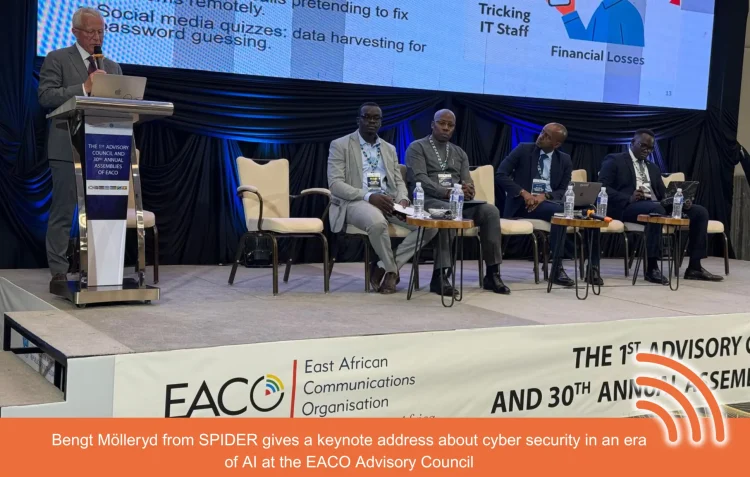
Digital transformation and inclusive growth in focus
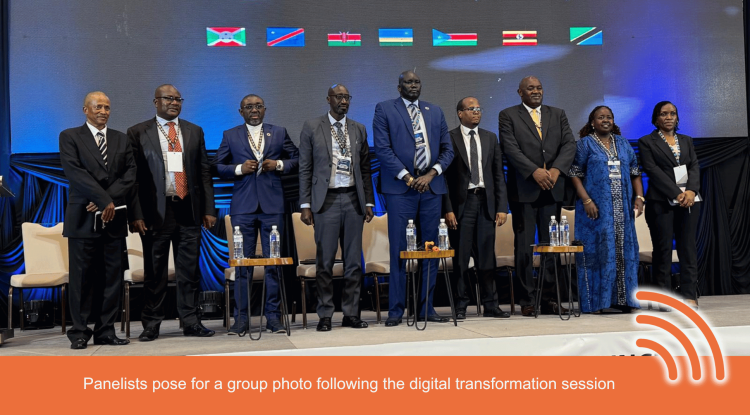
Day 1 focused on digital transformation as a critical dimension towards unlocking East African socio-economic development potential. Loads of thematic sessions were debated, including the following topics:
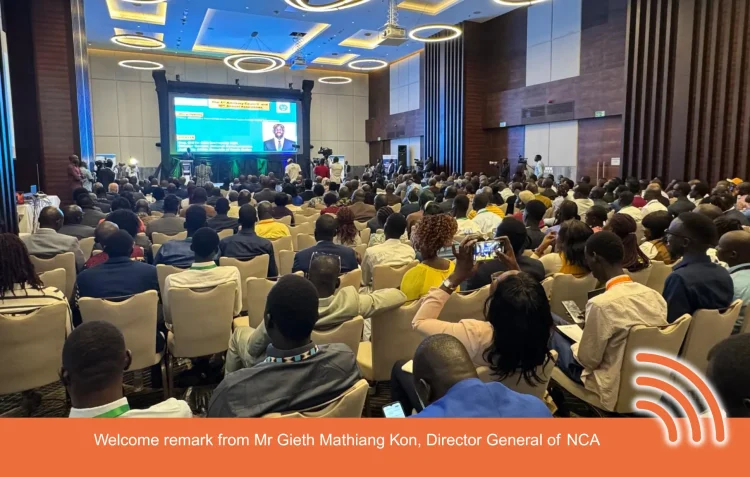
South Sudan hosting the Assemblies enhances NCA's regional leadership in telecommunications matters and projects to establish a digital hub.
"When we deliberate over the coming days, let us remain aware that the policies, recommendations, and standards we adopt here will ultimately touch many lives," stated Mr Gieth Mathiang Kon, Director General of NCA, during the opening day.
Regional leaders join forces to frame ICT policy
Day Two was marked by the official inauguration of the General Assemblies, drawing together regulatory and operational stakeholders from across East Africa. The arrival of Hon. Dr. Chris Baryomunsi, Minister of ICT and National Guidance from Uganda was warmly welcomed by top officials from the host country. The participation of such senior policymakers surely demonstrates a shared commitment to the region harmonising its ICT policy and regulatory framework with regional priorities and the African Union’s digital transformation agenda.
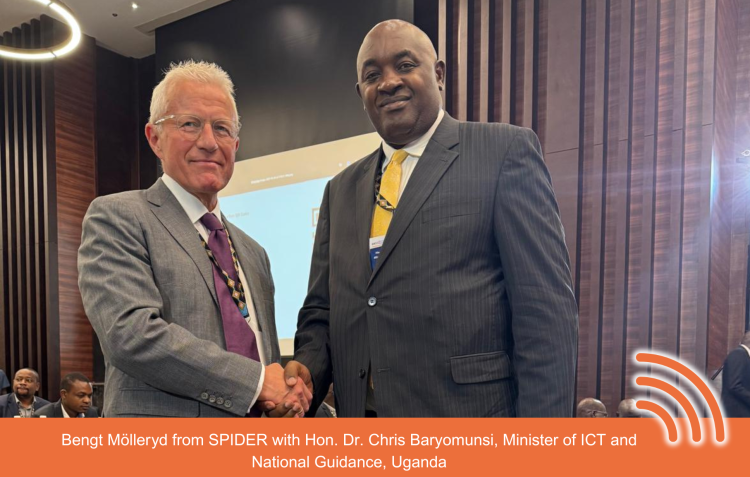
Marking a new chapter in regional ICT leadership
Reflecting the successful conclusion of the 1st Advisory Council meetings, the National Communication Authority announced that the 1st Advisory Council meetings had come to a close after being held from 11 to 13 June 2025 in Juba.
The final day was characterised by a comprehensive report from the outgoing Chair of EACO, Dr. Samuel Muhizi of Burundi, offering key reflections on the organisation's progress and its strategic priorities. However, a significant moment in the proceedings saw the official handover of the EACO chairmanship from Dr. Muhizi to Mr. Gieth Kon Mathiang, Director-General of the NCA, South Sudan.
In their final moments, the meetings adopted a Final Communiqué that encapsulated crucial resolutions and undertakings from member states aimed at enhancing collaboration and expediting digital transformation across East Africa.
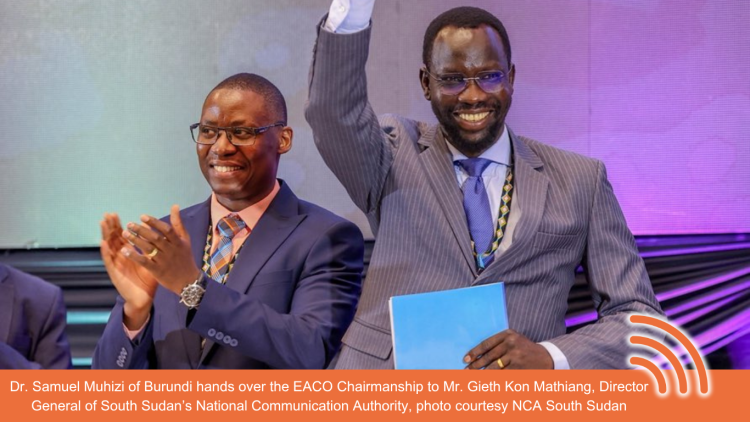
The interface for collaboration and regional integration
EACO remains firmly positioned in coordinating the regional space for inclusive and sustainable growth through digital transformation. These instruments- the Advisory Council and General Assembly- pave the way for peer learning, policy alignment, and institutional collaboration enhancement among the telecommunications sector of East Africa.
As a participant in iPRIS, EACO plays a pivotal role in assisting national national regulatory authorities (NRAs) as they strive to implement their change initiatives in their respective countries.
For more updates from the EACO 1st Advisory Council and 30th General Assemblies, follow the official proceedings here
For more information on the role of Regional Regulatory Organisations (RROs) like EACO in iPRIS, click here
iPRIS is coordinated and implemented by SPIDER in strategic and technical partnership with the Swedish Post and Telecom Authority (PTS) and the Luxembourg Regulatory Institute (ILR).
iPRIS is funded by the European Union, Sweden, and Luxembourg as part of the Team Europe Initiative “D4D for Digital Economy and Society in Sub-Saharan Africa” (Code: 001).
[et_pb_section fb_built="1" admin_label="section" _builder_version="4.16" global_colors_info="{}"][et_pb_row admin_label="row" _builder_version="4.16" background_size="initial" background_position="top_left" background_repeat="repeat" global_colors_info="{}"][et_pb_column type="4_4" _builder_version="4.16" custom_padding="|||" global_colors_info="{}" custom_padding__hover="|||"][et_pb_code _builder_version="4.23.1" _module_preset="default" global_colors_info="{}"][/et_pb_code][et_pb_text admin_label="Text" _builder_version="4.16" background_size="initial" background_position="top_left" background_repeat="repeat" global_colors_info="{}"]
During November 2023, national regulators from Eswatini, Kenya, Namibia, Sierra Leone, South Sudan and Zambia took part in a 2.5 weeks training programme in Stockholm, Sweden as part of the European phase of the iPRIS training.
Alexandra Högberg from SPIDER Center interviewed Dr. Emma Otieno from the Communications Authority of Kenya along the Sweden 2023 phase. In this interview, Dr. Emma Otieno weighs in on the important role national regulators play in ensuring affordability and digital inclusion.
This interview has been edited for clarity and readability.
Emma Otieno: My name is Dr. Emma Otieno. I work with the national regulator that is the Communications Authority of Kenya. Communication authority of Kenya is a regulatory body for the ICT industry, in Kenya. Within the regulator, I work in the Universal Service Fund function, where we actually seek to support the country in achieving its digital transformation agenda through running out projects for digital inclusivity.
Alexandra Högberg: What role do you see the regulator's playing in ensuring that Africa takes its share of the digital transformation revolution?
EO: I think the regulator is the most critical institution within the government set up for the development of ICTs. This is because the regulator is the key link between the national discussion and the global discussion, and as we all know, is that ICT development has now become a boundaries, a kind of an undertaking, and we need to have this conversation with partners with collaborators and financiers, with donors, with the technical minds, and it is a conversation that cannot happen in country. So with the regulatory linkage between the association starting from the regional associations, for instance, in East Africa, we have the East Africa community communication organisation. At the African level, we have the Africa Telecommunications Union, then we move on to like institutions like the International Telecommunications Union, that is the ITU. So, these are linkage that the regulator creates between the internal and external is the most critical. Secondly, the regulator has the expertise in terms of the different segments of what we require for digital development of digital transformation. We know about issues over competition management, Universal Service Fund, quality management, making communication services affordable, accessible, and also in terms of ensuring that there is equity. So the regulator is a person or an institution that ensures us this is all happening in a coordinated manner.
AH: What are the challenges and opportunities nationally and regionally that you think you want to highlight in terms of ensuring that we leave no one behind?
EO: There are several challenges, especially in the developing country. One is the affordability of communication services. That is an issue that we really have to address because of competing interests between how to access food, how to access other basic essentials, and communication, which has just joined this segment of what we would call basic necessities. So the cost of communication services, the cost of broadband, the cost of buying airtime, the cost of devices. And this is not being made better by the rate at which the inflation is happening in developing countries, taxation issues, these are really becoming top of the issues causing affordability or access to services. And then of course, the nature of policies that we are adopting in the developing countries and the rate at which these policies have been changed and very slow. So coming up with synergies between the legislation, the executive, and even the judiciary, arms of government so that they can bring synergy to come up with policies and regulations that are working towards enhancing affordability enhancing accessibility, enhancing availability over ICTs is quite an issue that we see, and then there's another issue in terms of like the devices. Other than affording the service itself, access to devices in Africa because we are not a manufacturing segment of the globe, most of the times we import devices. So smart handsets, which are actually the basic of accessing broadband have become quite expensive and with the increase in the exchange rates we are seeing right now the dollar rate is going higher and higher by the day. So that means that whatever is being imported, is actually costing more. So that is really becoming an encumbrance in terms of how we can actually ensure that people have access to device, so they already have a smart device, you cannot access broadband. And also the cost of rolling out broadband is not easy. The government's are competing with budgets. They have many, many interests, education, health. So actually, investing in rolling out infrastructure has also become quite a challenge for the countries in the developing side of this world. So affordability issues or financing, issues of devices, issues of policies and regulations that are actually ensuring that in diversity, equity inclusion, quite some of these things that we must collaboratively look at to ensure that no one is left behind.
AH: Thank you.
[/et_pb_text][/et_pb_column][/et_pb_row][/et_pb_section]
[et_pb_section fb_built="1" admin_label="section" _builder_version="4.16" global_colors_info="{}" theme_builder_area="post_content"][et_pb_row admin_label="row" _builder_version="4.16" background_size="initial" background_position="top_left" background_repeat="repeat" global_colors_info="{}" theme_builder_area="post_content"][et_pb_column type="4_4" _builder_version="4.16" custom_padding="|||" global_colors_info="{}" custom_padding__hover="|||" theme_builder_area="post_content"][et_pb_code _builder_version="4.23.1" _module_preset="default" global_colors_info="{}" theme_builder_area="post_content"][/et_pb_code][et_pb_text admin_label="Text" _builder_version="4.16" background_size="initial" background_position="top_left" background_repeat="repeat" global_colors_info="{}" theme_builder_area="post_content"]
Alexandra Högberg from SPIDER Center interviewed Obioma Benson Kekeocha - Principal Manager, Nigeria Communication Commission (NCC), along the sidelines of the Sweden 2023 phase. In this interview, Obioma Benson Kekeocha weighs in on competition, diversity, equity, and inclusion.
This interview has been edited for clarity and readability.
Alexandra Högberg: Could you please introduce yourself?
Benson Kekeocha: My name is Benson Kekeocha, I work with Nigeria Communications Commission.
AH: How can regulators contribute to the advancement of the ICT sector in Africa,
BK: Regulators in Africa will contribute to the advancement of technology in Africa by ensuring that the policies in their respective countries is such that contributes to the enhancement of technologies. For instance, now that where we are moving towards the new digital era, regulations should be such that is open, that should be kind of develop regulations which ensure that our regulations are such that will not stifle competition, will not stifle innovation, but we enhance development and innovation of the sector. So what we'll do right now is to ensure that all our regulatory instrument are such that if they are not in line they should be reviewed to accommodate issues that will encourage and develop the industrial.
AH: What specific challenges does your country/region face in the current global telecommunication landscape? And how will your change initiative address this?
BK: We have a couple of challenges with respect to the delivery of telecom services. There's so many challenges that ranges from right of way issues, power issues, to competition issues, just abundance and competitive conduct. So, our change initiative has to do with competition, tariff issues in existing and emerging technologies. And talking about the issues related to competition, we have issues to do with identifying such anti-competitive conducts in industry, such as predatory pricing, cost of taxation, margin squeeze discriminatory pricing, identifying agreements or arrangements among operators that has an anti competitive practices. So these are challenges.
In terms of tariff, we have to ensure that every tariff we implement incorporates costs, operational services, it is transparent, and non-discriminative. So our tariffs must be cost effective, and subscriber friendly. So in our change initiatives, we've been able to streamline it to assessing the level of competition in the wholesale broadband and retail data market segment. This segment is not effectively competitive. Because in a vertical integrated market segment where you have an SMP, the SMP carries out certain conduct that lessens the performance of other competitors in the industry. So our change initiative, we aim at identifying those conducts/practices, that lessens competition, and proper solutions, regulatory framework that could be targeted at making sure that every player in industry and choice services.
AH: Part of the iPRIS project, you also have the component of gender diversity, equity and inclusion. What have you taken away from that segment and how you work with your change initiative or how your organisation works with making sure that no one is behind it the digital transformation journey.
BK: With respect to change initiatives and diversity, equity and inclusiveness in my region or in my environment, we ensure that we consult widely, we carry everyone along because for every decision that borders all these stakeholders, which includes both the operator and the subscribers, we must ensure that they are consulted, and then we don't want to leave anyone behind. We try to ensure that we bridge the gap, the digital divide and assure that everyone is inclusive, is always included in assessing services with either aspects of your gender, your age, or your race, you carry everyone along. With respect to our tariffs, you know, we assure that every tariff we implement cuts across the entire country. We do not implement any sectional or discriminatory tariff or services, everyone is being carried around to ensure that there is inclusiveness in our service, irrespective of your gender, or your tribe, or your financial status.
AH: Highlights from the time here in Sweden?
BK: I think the program is well thought out. It has helped to bring in people from various parts of Africa for capacity building. We benchmark or we have knowledge of what happens with other jurisdictions, and we try to pass on this also, and I think it's a good program. From time to time, each MCI will help to develop with other region that identify this as a challenge.
AH: The peer to peer learning is a key component of iPRIS. Are there any specific lessons or opportunities or tips that you have taken on board from any of the other national regulatory authorities that you would like to highlight?
BK: Not quite, because NCC, we have gone ahead, we're far ahead of so many other regulatory agencies in the Sub Saharan Africa. In each of the segments, talking about intact rates, we have been developing over time, computer assessment issues, designated operator in the voice and data segment. We’re foremost, so being with them here, they learn from us. There's no area of regulatory instrument that we have not touched on, from reverse service provision to having a Consumer Affairs Bureau, to pricing, to competition, to licensing, to spectrum issues, where we’re far ahead of them.
When I mentioned that, we have developed a regulation for spectral trading, it sounds strange to them because today, if you don't use the spectrum, you don't lose it. Okay, your spectrum, you can trade it, which means you can transfer it, you can share it, you can lose it, these are things they are learning from us. Okay, we have developed regulation with respect to national roaming. When I told him that look, we have developed national roaming guidelines, and two operators have tested or have a trial period for national roaming, it sounds strange. Talking about regulations on infrastructure, sharing a co-location. So most of Africa countries, they're happy to learn from what Nigeria has with respect to the telecom sector in Nigeria.
[/et_pb_text][/et_pb_column][/et_pb_row][/et_pb_section]
Borgarfjordsgatan 12, Kista,SWEDEN
Postal Address: Stockholm University, Department of Computer and Systems Sciences/DSV, SPIDER, P.O Box 1073, SE-164 25 Kista, Sweden
Copyright © 2025 iPRIS. All rights reserved.